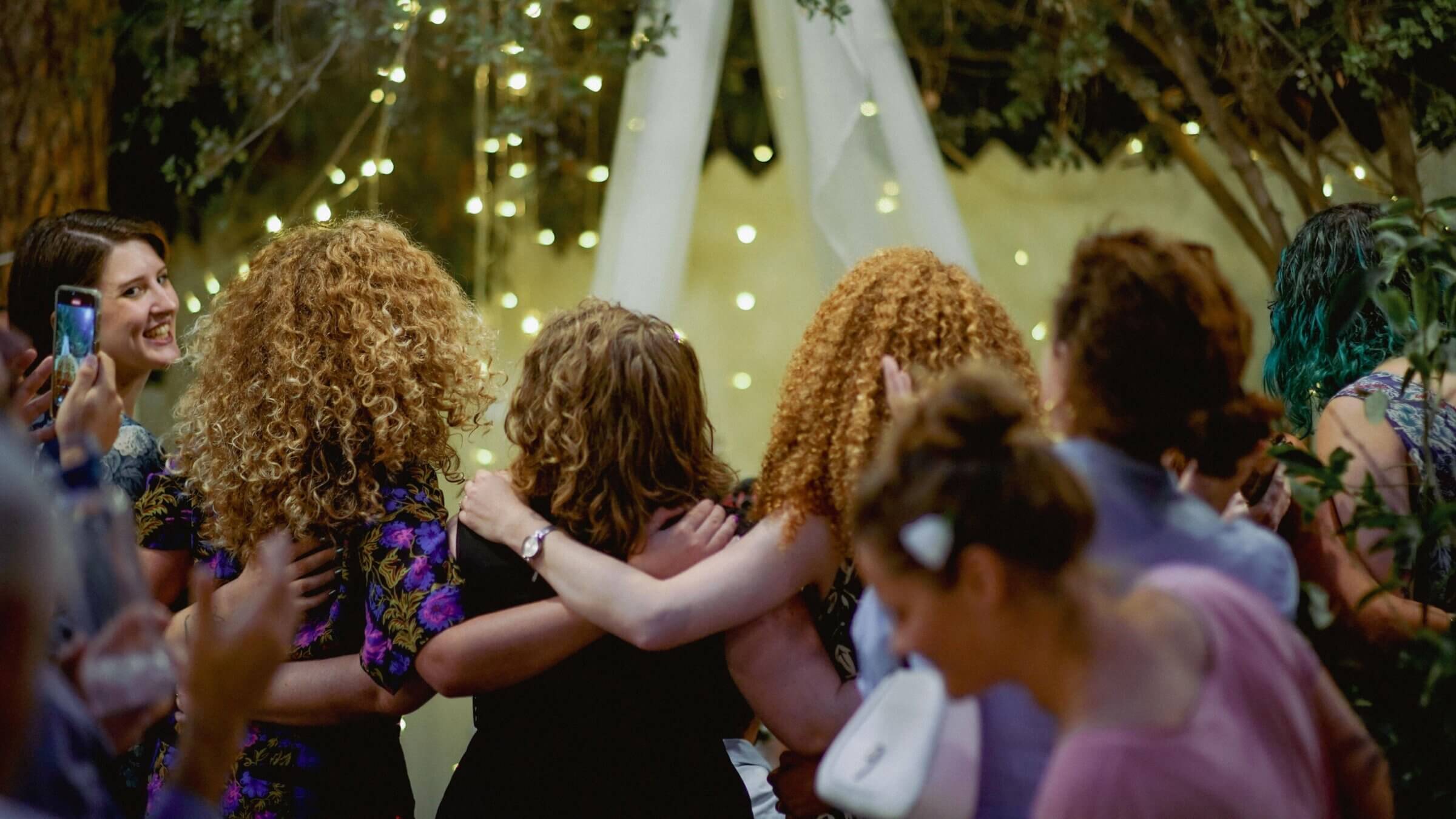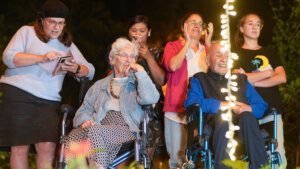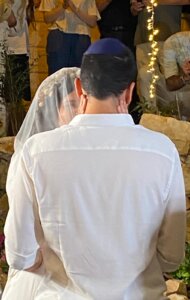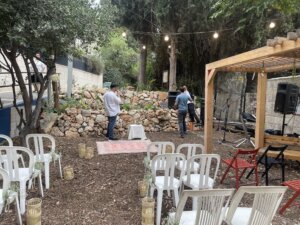Wedding during wartime: A donated cake, a volunteer band, fairy lights by the bomb shelter
Jewish law says marriages go forward even in times of tragedy

Planned for a large hall that could fit 400, the wedding took place in a small community garden. Photo by Shira Billig
JERUSALEM — My daughter was preparing for her wedding when the siren blared.
In the bomb shelter in her Jerusalem apartment building, a friend touched up her makeup.
They heard the booms outside — the Iron Dome at work, trying to intercept a barrage of rockets from the Gaza Strip. We learned later that some got through, causing serious injuries.
The wedding, long scheduled for Monday, Oct. 9, was supposed to be held at a wedding hall in Modi’in, a city between Jerusalem and Tel Aviv, with more than 400 guests. On Sunday, after the worst attack on Israel in half a century, we announced a postponement. But on Monday morning, the bride and groom decided to go ahead with the ceremony, now in a small community garden across the street from his parents’ apartment in Jerusalem, with a few family members and close friends.

Jewish weddings go forward even during times of tragedy. As the Talmud instructs in Masechet Ketubot, the section on marriage: “If a funeral procession and a wedding procession meet at an intersection, the wedding procession goes first.”
I scrambled to collect some simple refreshments — a few bottles of fizzy wine, a six-pack of beer, fruit and cheese and cookies and crackers.
I was driving to the wedding with the supplies, an hour before the 6 p.m. scheduled start, when the Home Front Command app on my phone sounded the alarm. Here in Jerusalem, we have 90 seconds to get to a protected space; those nearer Gaza have only 15. A boy ran down the sidewalk, shouting that there was a mamad, or safe room, in a nearby grocery store’s parking garage.
Then came the booms … and we continued on our way.
We arrived at the little garden to find dozens of strangers making the place beautiful under the direction of teenage girls and boys in their green scout T-shirts — sweeping up, hanging fairy lights from the trees, arranging plastic chairs.
‘The best possible wedding’
Some had learned about the impromptu ceremony from Facebook or WhatsApp. Neighbors walking by asked how they could help.
A klezmer band — four middle-aged men in white shirts and black pants — was setting up sound equipment. Nobody had hired them. They just appeared.
Someone had donated a “mazel tov” cake from her brother’s canceled engagement party.
Someone else brought a wheelbarrow and filled it with ice to serve as a bar. A man handed the groom a bottle of good whiskey.
The strangers offered their congratulations and thanks for the relief from doom-scrolling and body counts. They were grateful to have something — anything — to do.

The bride, 27, sat on a lace-draped throne, the kisay kalah in Hebrew, under a tree, giving the traditional blessings to the guests. One friend stood by with tissues at the ready as the bride’s sisters and friends she’d known since we made aliyah in 2007 serenaded her.
A graduate of Hebrew University, she did her national service handling social media for the foreign ministry and now works in development at a research institute. She’s scheduled to start graduate school next week.
Her father and I led her to the chuppah — a few dozen steps from the entrance to the garden’s own spacious bomb shelter decorated with childrens’ artwork. The blond teenaged son of the man with the whiskey held up one of the bamboo poles.
The groom, 29, an architecture student and (like most Israelis) a reserve soldier, awaited. The couple met waiting tables at an upscale meat restaurant. Six years ago, they hiked the Israel Trail together — 650 miles from the border with Lebanon to the border with Egypt.
Neighbors watched from their balconies and strollers and wheelchairs, singing and clapping through the seven blessings that form the core of the traditional Jewish wedding ceremony.
Blessed are you, Adonai, our God, ruler of the universe, who created joy and gladness, loving couples, mirth, glad song, pleasure, delight, love, loving communities, peace, and companionship.
Adonai, our God, let there soon be heard in the cities of Judah and the streets of Jerusalem the sound of joy and the sound of gladness, the voice of the loving couple, the sound of the their jubilance from their canopies and of the youths from their song-filled feasts. Blessed are you who causes the couple to rejoice, one with the other.
The sages teach that the spirits of the couple’s grandparents and great-grandparents hover over the chuppah to see their descendants united. I put a doily made by the bride’s father’s grandmother under the wine goblet to show her she hadn’t been forgotten by the baby she’d met in Florida 27 years earlier.

The groom stomped a glass to remind us of the tragedies that have befallen Jerusalem and the Jewish people — as if we needed reminding on this night. It was wrapped in the same napkin used at my own wedding 30 years earlier in San Francisco. The shards made sharp new cuts next to the time-softened old ones.
And then there was dancing and pizza and an Aperol spritz for the bride.
The scouts cleaned up and ate the leftovers.
It was the best wedding ever — the best possible wedding — because every part of it was made with love and hope. Every stranger instantly became family.
The day after the wedding, the newlyweds went to sit shiva with a family from London whose 20-year-old son, a lone soldier and a member of the Golani Brigade, had been killed by Hamas on the Gaza border.
When they mentioned the wedding, just for a moment the bereaved mother’s face lit up with joy.




















